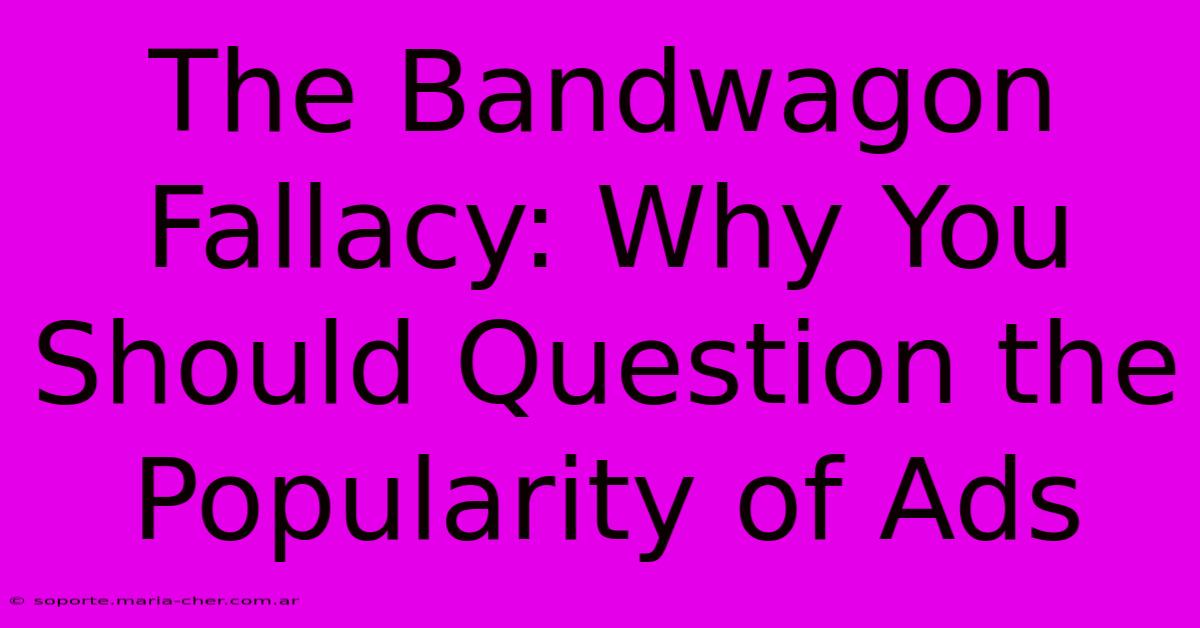The Bandwagon Fallacy: Why You Should Question The Popularity Of Ads

Table of Contents
The Bandwagon Fallacy: Why You Should Question the Popularity of Ads
We're constantly bombarded with advertisements. From catchy jingles on the radio to sleek product placements in our favorite shows, marketing messages are inescapable. But have you ever stopped to consider why a product is so popular? Often, the answer lies in a powerful, yet flawed, logical fallacy: the bandwagon fallacy. This article will delve into the bandwagon fallacy, explaining how advertisers exploit it and why you should cultivate a healthy skepticism towards popular trends, especially when they're fueled by marketing.
Understanding the Bandwagon Fallacy
The bandwagon fallacy, also known as argumentum ad populum, is a flawed argument that concludes something is true or good simply because it's popular or many people believe it. It essentially equates popularity with validity. The core structure is:
- Premise: Many people believe X.
- Conclusion: Therefore, X is true/good/desirable.
This is a fallacy because popularity doesn't inherently validate truth or quality. Something can be wildly popular and utterly useless, harmful, or even false. Think of fads – they often burn brightly for a short time before fading into obscurity, leaving behind a trail of disappointed consumers.
How Advertisers Exploit the Bandwagon Effect
Advertisers are masters at manipulating the bandwagon fallacy. They achieve this in several ways:
1. Highlighting Popularity Statistics:
Ads frequently boast about being "the number one choice," "best-selling," or "most popular." These claims, while potentially true, prey on our inherent desire to align with the majority. We're wired to seek social acceptance, and marketers cleverly leverage this by implying that choosing their product is the socially acceptable choice.
2. Creating a Sense of Urgency and Scarcity:
Limited-time offers, "while supplies last" promotions, and countdown timers all create a sense of urgency. This plays on the fear of missing out (FOMO), pushing consumers to jump on the bandwagon before it's too late, regardless of the product's actual merit.
3. Showcasing Celebrities and Influencers:
Using celebrities or influencers to endorse a product leverages their popularity. The implicit message is: "If they use it, it must be good." However, this ignores the possibility that the celebrity is simply being paid to endorse a product they may not even use or believe in.
4. Creating a Social Media Buzz:
Social media platforms are rife with viral trends and challenges. Advertisers often capitalize on this by creating campaigns designed to go viral, fostering the illusion that everyone is using or enjoying their product. The sheer volume of online engagement can create a misleading sense of widespread acceptance.
Why You Should Question Popular Ads
While it's natural to be influenced by popularity, it's crucial to develop critical thinking skills when assessing advertised products. Here's why questioning the popularity of ads is essential:
- Avoid Wasting Money: Popular doesn't equal good value. Many popular products are overpriced or offer inferior quality compared to lesser-known alternatives.
- Make Informed Decisions: Instead of relying on popularity, focus on researching features, reading reviews from independent sources, and comparing prices.
- Resist Social Pressure: Don't let the pressure to conform influence your purchasing decisions. Develop your own preferences and make choices based on your individual needs and values.
- Support Ethical Businesses: Questioning the methods advertisers use can help you identify and support businesses that prioritize quality and ethical practices over manipulative marketing tactics.
Conclusion: Think Critically, Choose Wisely
The bandwagon fallacy is a powerful tool in the advertiser's arsenal. By understanding how it works and developing a critical eye, you can navigate the world of marketing with greater discernment and make informed purchasing decisions. Don't blindly follow the crowd; think critically and choose wisely. Your wallet – and your satisfaction – will thank you.

Thank you for visiting our website wich cover about The Bandwagon Fallacy: Why You Should Question The Popularity Of Ads. We hope the information provided has been useful to you. Feel free to contact us if you have any questions or need further assistance. See you next time and dont miss to bookmark.
Featured Posts
-
Attention Luxury Seekers Unveil The Secret Weapon In The Slc Vs Tlc Rivalry
Feb 08, 2025
-
Dresses For Dreams St John Evening Gowns That Will Make You Feel Like A Princess
Feb 08, 2025
-
Unlock The Mystery Polaroid Picture Sizes Explained For All Photographers
Feb 08, 2025
-
Capture The Essence Of Life With The Leica V Lux 1 Camera Your Gateway To Stunning Photography
Feb 08, 2025
-
The Saints Logo A Timeless Icon Of Faith And Football Fire
Feb 08, 2025
